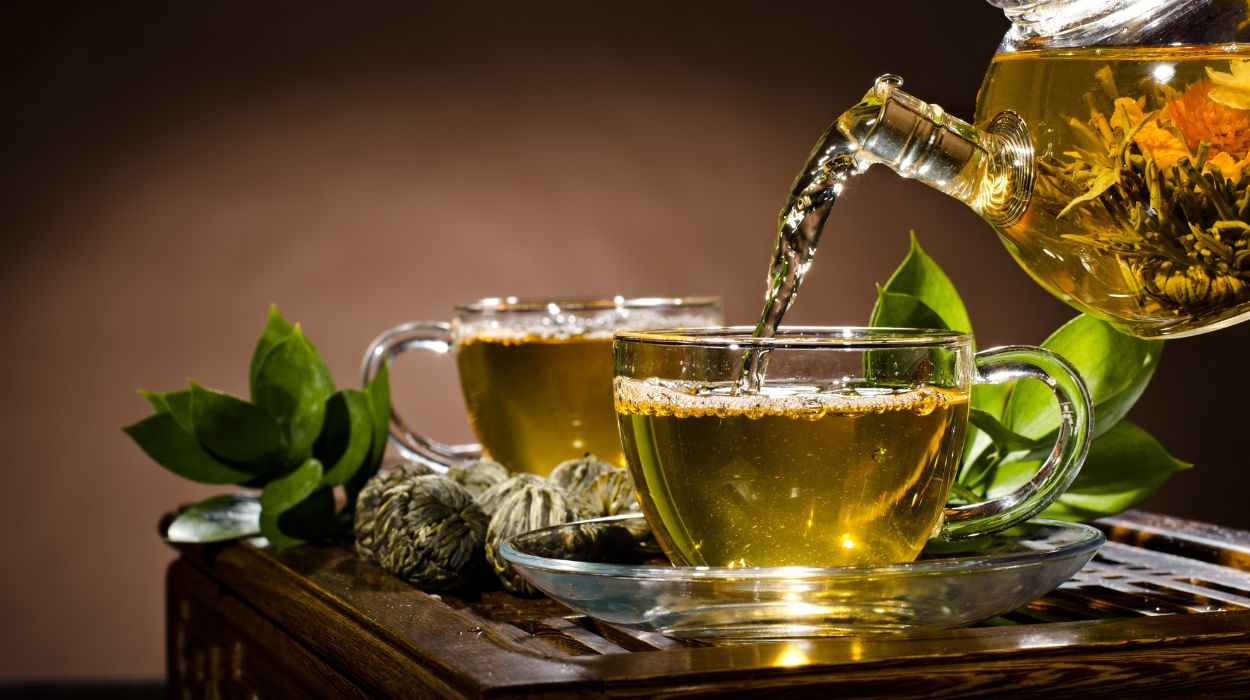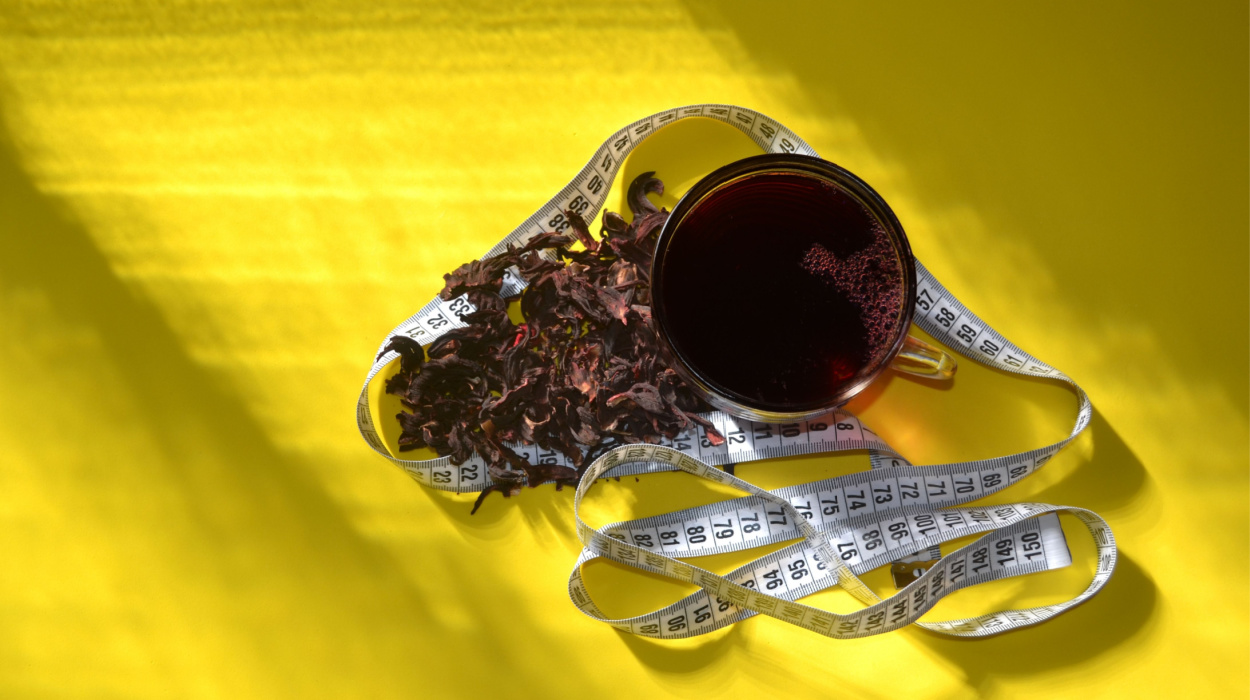When it comes to detox tea for weight loss, most people think of black tea and green tea. But the beauty of these teas is that they offer other health advantages aside from weight loss. For example, the health benefits of green tea include heart health, diabetes control, brain health, cancer prevention, and more.
So, how much weight can you lose with detox tea?
Unfortunately, for healthy, long-term weight loss, you’ll want to focus on a holistic approach with a balanced diet, stress management, and exercise routines, not just on what kind of tea you are drinking. So, instead of buying expensive and short-term diet pills or fat burners, it is more important and effective to slowly adopt healthier lifestyle habits.
Nevertheless, tea can help make your weight loss journey easier. Read on to learn tasty new weight loss detox drinks you might enjoy.
Best Detox Tea For Weight Loss
Detox teas can help with weight loss, albeit not all of it is fat loss. Here are our top five recommendations to help you reduce weight.
- Green Tea.
- Black Tea.
- Oolong Tea.
- Dandelion Tea.
- White Tea.
Detox Tea For Weight Loss

Detox teas are a blend of spices, botanicals, and herbs that aid in the elimination of toxins from the body. Some of the greatest organic detox tea options include:
Green Tea
If you’re looking for the best detox tea for weight loss and belly fat loss, green tea may be it. It’s an effective fat burner due to the presence of antioxidants known as catechins.[1] They boost weight and fat loss[2] by breaking down stored fat and converting it to energy. Additionally, antioxidants limit the development of new fat cells, or adipogenesis,[2] by reducing fat accumulation in adipose tissues.[3]
Green tea extract also aids weight loss by decreasing your hunger.[4] Its antioxidants raise levels of cholecystokinin,[5] a hunger-suppressing hormone. The hormone is also crucial for increasing fat and protein digestion.
Black Tea
Black tea has metabolic benefits because it includes theaflavins,[6] which are chemicals created during the fermentation process. They stimulate thermogenesis, which results in the burning of calories.
How many calories does black tea burn? It’s difficult to give an exact amount because variables such as brewing time and tea leaf concentration have to be considered.
Another factor that contributes to black tea being the best detox tea for weight loss is its ability to decrease appetite.
It decreases hunger since it includes caffeine. Caffeine suppresses your appetite, making it an excellent beverage for meeting a calorie deficit. Too much caffeine, ironically, can boost your appetite,[7] so drink it in moderation.
Oolong Tea
Oolong tea can help you lose weight thanks to its hypoglycemic characteristics.[8] It aids in the reduction of blood sugar levels. You won’t experience as many cravings or hunger sensations because your glucose levels are low. As a result, you’ll likely consume fewer calories if you just consume pure oolong tea without any added sugar, milk, or syrup.
Dandelion Tea
Dandelion tea is primarily recognized for its diuretic qualities[9] due to its potassium content. As a diuretic, potassium increases sodium excretion, which in turn raises the rate of water loss through urine. As a result, it’s a wonderful drink to ingest if you have gained water weight. As previously stated, decreasing water weight has little effect on fat loss.
Because of its capacity to promote healthy digestion, this tea is also beneficial for weight loss. It increases the synthesis of bile and digestive enzymes, which aid in the breakdown and absorption of nutrients from food. That means your body only obtains the nutrients it requires and discards the ones it doesn’t, which might lead to weight loss.
White Tea
White tea has a lot of polyphenols,[10] which are antioxidants that aid in weight loss by converting stored fat into energy. They accomplish this by increasing the activity of enzymes such as hormone-sensitive lipase. Polyphenols also limit the action of fatty acid synthase, which contributes to weight gain.
White tea polyphenols are thought to help decrease hunger by altering hormones that govern hunger. This could result in increased satiety and better weight management. However, additional research is needed to better understand and confirm the effects.
Best Time To Drink Detox Tea For Weight Loss

There is no best time to drink detox tea for weight loss. That means you can drink your tea whenever you choose, except you might want to avoid caffeinated teas in the evening for a better night’s sleep.
There are also some advantages associated with drinking certain detox teas at specific times, such as:
Morning Time
It’s normal to feel a little dehydrated after waking up in the morning. This is because you are not actively drinking water while sleeping. You also lose some water during respiration. Drinking detox tea first thing in the morning replenishes fluids and hydrates your body.
When some people wake up in the morning, they are tired. You’re more likely to lose focus or fall asleep as a result. Because they contain caffeine, detox teas, especially green tea, can give you more energy and help you think more clearly.
Between Meals
Drinking detox teas containing herbal blends may help you prevent overeating. They might keep you full between meals or help fill you up if you drink them with a meal.
With a feeling of fullness thanks to some caffeine, you might have fewer cravings. That can help you be more conscious of your portion sizes and avoid making unhealthy food choices.
Some people accompany their meals with sugary drinks like juice or alcoholic beverages[11] like wine. The problem with these drinks is that they are high in calories, which can lead to weight gain. Fortunately, detox teas are often minimal calories if no sweetener is added, and can be great alternatives to sugary drinks.
Evening Hours
Do you ever come home from work stressed and exhausted? Calming detox teas have been shown to help reduce stress,[12] making them perfect after and during your work day.
Some of the most relaxing teas include lavender, valerian root, and chamomile. These teas can also help calm your body down before sleeping, giving you a better night of rest to power you through the next day.
How To Make Detox Tea For Weight Loss
Making detox tea is one of the simplest drinks to make. All you need is some hot water, tea bags, and maybe some spices or herbs if you want to get creative. Here’s a simple detox tea for weight loss recipe to get you started:
Steps:
- Bring 1-2 cups of water to a boil. You may also make this tea with detox water as the base.
- Once the water is boiling, add 1-2 tablespoons of your choice tea.
- Cover the pot for 3-5 minutes while the tea continues to boil.
- To add flavor to your tea, add optional additions such as cinnamon, mint, or lemon slices.
- Continue to boil the tea for 3 minutes after adding the optional spices.
- If you used a tea bag to make your tea, remove it once the tea has finished cooking. Tea leaves will need to be separated using a sieve.
Is Detox Tea Good For Weight Loss?
Detox teas are a popular weight-loss aid in marketing campaigns due to their purported cleansing and metabolism-boosting effects. However, there isn’t a lot of evidence that they work for significant weight loss. Overall, it doesn’t have much of an effect on weight, but some components, like green tea, may have small thermogenic benefits.
When you first start losing weight, it’s most likely water weight rather than fat. Because detox teas contain diuretic ingredients, you may experience a brief loss of fluids.
If you’re trying to lose weight quickly, keep in mind that harsh short-term restrictions don’t lead to long-term results. Instead, they can lead to yo-yo dieting and disordered eating habits.[13]
You might be thinking it’s a good idea to drink a lot of detox tea to lose weight fast, but that’s not recommended. To begin with, detox teas dehydrate the body by increasing urine production.[14] They also won’t give you the nutrition you need to feel energized throughout the day.
Long-term weight loss success is built on a healthy diet and consistent activity. A healthy lifestyle may include detox teas, but you should consult your doctor before using them to shed or keep weight off.
Conclusion
Different detox teas may lead you to lose weight in different ways. Some stimulate enzymes that break down fat, while others create urine to eliminate water weight.
While detox tea can help you lose weight, its effects are minor. If you add sugar to them, you may even gain weight if the sugars contribute to an overall caloric excess. Consider detox tea as dietary supplements for weight loss, and as a tasty drink full of antioxidants and some caffeine to give you a boost.
Frequently Asked Questions
No tea can support weight loss on its own, but its effects can be greater when combined with dieting and exercising. A few teas that support weight loss include oolong tea, green tea, white tea, and dandelion tea.
No drink can reduce belly fat by itself, so you can only incorporate certain drinks into your overall healthy lifestyle routines. Some drinks that can help you lose belly fat include herbal teas, green tea, water, and lemon water.
Although walking is a great way to lose belly fat, spot reduction is impossible with it. Therefore, walking promotes weight loss of the whole body, including the belly by burning calories.
Detox teas can be harmful when drunk excessively or used for prolonged periods. Some contain laxatives or diuretics, which can lead to dependency, dehydration, and digestive issues. Therefore, drink them in moderation to avoid these side effects.
A holistic approach that includes a balanced diet, stress management, and exercise is the most effective way to lose weight. While detox teas can promote weight loss, they shouldn’t replace dieting and exercising. One reason for that is that they cause negligible weight loss.
Since children are still growing, they still need certain nutritional needs that detox teas don’t provide. When used excessively, they may promote satiety, which means kids will not eat as much. Therefore, you should prioritize healthy lifestyle habits and dieting.
Before mentioning the teas, you should know that individual reactions to detox teas can vary. Detox teas that tend to be unsafe, include those with senna, excess caffeine, and undisclosed herbal blends.
Detox teas can cause allergic reactions in some people. The teas that usually trigger allergic reactions are those made with flowers, spices, herbs, and peppermint. Allergic reactions from detox teas may either be mild or severe.
 Evidence Based
Evidence Based
